By Martin J. Sklar · Wednesday, May 4, 2016 Martin J. Sklar, who died in 2014, was a historian, left-wing activist, and original thinker. As a scholar/journalist-activist, he founded Studies on the Left, co-founded Socialist Revolution and In These Times, and was a founding member of The Historical Society. As a historian, he originated the influential concepts of “corporate liberalism” and “disaccumulation” and shaped the thinking of historians of the Progressive Era, the Jefferson–Hamilton divide, Lincoln’s revolutionary role in ending slavery, the sources and consequences of U.S. imperialism—and more.
Continue reading →
By Mohammed Saif-Alden Wattad · Tuesday, June 23, 2015
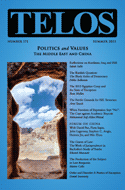 It is this article’s assertion that calls for academic boycott contradict with the classic rationales of the right to free expression and with the peculiar features of the right to academic freedom. Freedom of expression is about developing a dialogue between two opposing opinions, wherein each claims to be the right one. Calls for academic boycott promote monologues rather than dialogues, thus creating the illusion that they represent the truth because they are not challenged. Moreover, protecting the right to academic freedom of individual academics is necessary for their fulfillment as researchers who can respect academic standards exclusively rather than institutional mandates. The self-fulfillment for an individual academic is enacted through the ability to convey messages that can compete against other views. It is this article’s assertion that calls for academic boycott contradict with the classic rationales of the right to free expression and with the peculiar features of the right to academic freedom. Freedom of expression is about developing a dialogue between two opposing opinions, wherein each claims to be the right one. Calls for academic boycott promote monologues rather than dialogues, thus creating the illusion that they represent the truth because they are not challenged. Moreover, protecting the right to academic freedom of individual academics is necessary for their fulfillment as researchers who can respect academic standards exclusively rather than institutional mandates. The self-fulfillment for an individual academic is enacted through the ability to convey messages that can compete against other views.
Continue reading →
By Timothy Melley · Tuesday, March 31, 2015
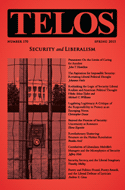 Western societies increasingly imagine, plan, and even rehearse their own destruction. This cultural habit reflects a growing contradiction in democracy. On the one hand, liberal societies laud the ideals of participatory democracy, free speech, individual liberty, and governmental transparency. On the other, they grow ever more committed to the biopolitical regulation of life, the mitigation of threats to public health and safety, and the restriction of liberties as a way of securing liberty itself. How do we understand the inexorable growth of a security paradigm in liberal democracies? The answer lies partly in the cultural imaginary that shapes public contemplation of citizenship, liberty, and security. This imaginary reflects both the growing influence of biopolitics and the legacy the Cold War covert action. Paradoxically, the Cold War state’s growing commitment to covert action was itself increasingly public; as a result, public culture has became obsessed with, and enamored of, covert affairs. Despite state secrecy, most citizens believe they know the “kinds of things” their government is doing in secret—yet they cannot know in detail, and they receive most of their knowledge in the form of melodramatic fiction. The result is a growing irrationality in the democratic public sphere. Western societies increasingly imagine, plan, and even rehearse their own destruction. This cultural habit reflects a growing contradiction in democracy. On the one hand, liberal societies laud the ideals of participatory democracy, free speech, individual liberty, and governmental transparency. On the other, they grow ever more committed to the biopolitical regulation of life, the mitigation of threats to public health and safety, and the restriction of liberties as a way of securing liberty itself. How do we understand the inexorable growth of a security paradigm in liberal democracies? The answer lies partly in the cultural imaginary that shapes public contemplation of citizenship, liberty, and security. This imaginary reflects both the growing influence of biopolitics and the legacy the Cold War covert action. Paradoxically, the Cold War state’s growing commitment to covert action was itself increasingly public; as a result, public culture has became obsessed with, and enamored of, covert affairs. Despite state secrecy, most citizens believe they know the “kinds of things” their government is doing in secret—yet they cannot know in detail, and they receive most of their knowledge in the form of melodramatic fiction. The result is a growing irrationality in the democratic public sphere.
Continue reading →
By Russell A. Berman · Monday, September 15, 2014 Telos 168 (Fall 2014) is now available for purchase in our store.
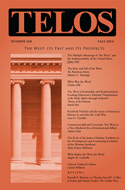 This special issue of Telos investigates the concept of the West. Far more than a geographical term, in intellectual, philosophical, and cultural history, it has been common to speak of a Western tradition in order to name lineages of thought from antiquity to the modern world. In cultural and political debates, Western values are invoked that are linked historically to a deep tradition specifically dedicated to desiderata such as freedom and individual dignity: at stake is the general possibility of any long-term tradition, the durability of culture over time, but also this very specific, distinctively Western tradition as the carrier of particular values. Politically this usage explains the reference to Western democracies (as opposed to the “peoples’ democracies” of the Soviet era) with the suggestion that democratic political forms and norms have emerged from the “Western tradition” and have generated the institutions of both liberal democracy, i.e., democratic procedures that assert popular sovereignty, while simultaneously protecting individual rights, and market economies shaped by the rule of law and the protection of private property. This special issue of Telos investigates the concept of the West. Far more than a geographical term, in intellectual, philosophical, and cultural history, it has been common to speak of a Western tradition in order to name lineages of thought from antiquity to the modern world. In cultural and political debates, Western values are invoked that are linked historically to a deep tradition specifically dedicated to desiderata such as freedom and individual dignity: at stake is the general possibility of any long-term tradition, the durability of culture over time, but also this very specific, distinctively Western tradition as the carrier of particular values. Politically this usage explains the reference to Western democracies (as opposed to the “peoples’ democracies” of the Soviet era) with the suggestion that democratic political forms and norms have emerged from the “Western tradition” and have generated the institutions of both liberal democracy, i.e., democratic procedures that assert popular sovereignty, while simultaneously protecting individual rights, and market economies shaped by the rule of law and the protection of private property.
Continue reading →
By Michael Millerman · Tuesday, August 12, 2014 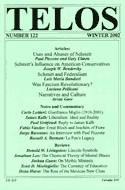 Like Spinoza, many liberal thinkers have defined the liberty they promote in terms of the necessity of submitting to the law that guarantees it. This is a unique kind of rule of law, a rule of the “‘politically correct,’ universalist, managerial-liberal” (9) law of contemporary liberals. Both internationally and domestically, this law requires the muscular imposition of questionable political, moral, and economic principles, by means of an insidious and often nauseating bureaucratic, technocratic, mediacratic apparatus, onto largely unwilling publics. Crucially, the freedom championed by such liberals and allegedly secured by their law does not include the freedom to refuse their domination root and branch. Like Spinoza, many liberal thinkers have defined the liberty they promote in terms of the necessity of submitting to the law that guarantees it. This is a unique kind of rule of law, a rule of the “‘politically correct,’ universalist, managerial-liberal” (9) law of contemporary liberals. Both internationally and domestically, this law requires the muscular imposition of questionable political, moral, and economic principles, by means of an insidious and often nauseating bureaucratic, technocratic, mediacratic apparatus, onto largely unwilling publics. Crucially, the freedom championed by such liberals and allegedly secured by their law does not include the freedom to refuse their domination root and branch.
Continue reading →
By Pablo Bustinduy · Tuesday, March 18, 2014 The following paper was presented at the Eighth Annual Telos Conference, held on February 15–16, 2014, in New York City.
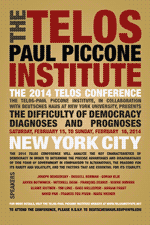 Two french communist authors recently devoted a book to an attempt at the systematic demolishment of the logic of democracy. What makes their gesture interesting is that their critique of democracy is made in the very name of autonomy, equality, and emancipation, that is, of the very principles that democracy is supposed to promote and uphold. One usually knows how to react to attacks on democracy coming from the other side, from those who ground their arguments in a celebration of some sort of hierarchy principle, those who deduce the political from an ontology of violence, or aim at naturalizing orders and political differences. In those cases there is usually not much to be said at all, because anti-democratic arguments are usually not recognized as belonging to the same conversation as democratic ones: when they are actually heard, anti-democratic arguments are usually subject to different logics of validation, enunciation and justification than democratic ones. This is for instance what the notion of extremism generally does: to locate a voice or an argument outside of the recognized universe of discourse, and hence somehow deprived of an equal standing, possibly subject to some version of the old Jacobin motto: “there shall be no freedom for the enemies of freedom.” The paradox is interesting in itself, because it betrays the presence of a certain politics of thought and speech that is already at work way before we get to discuss in a rational process the truths of political forms, and yet has substantial effects on what is heard (and not heard) in the supposedly transparent sphere of public discourse. It also forces us to recognize the recurring, foundational role of the limit, of the gesture that at the same time opens up and delimits the space of what is possible and what is acceptable, which is often overlooked or simplified in the context of democratic theory. Two french communist authors recently devoted a book to an attempt at the systematic demolishment of the logic of democracy. What makes their gesture interesting is that their critique of democracy is made in the very name of autonomy, equality, and emancipation, that is, of the very principles that democracy is supposed to promote and uphold. One usually knows how to react to attacks on democracy coming from the other side, from those who ground their arguments in a celebration of some sort of hierarchy principle, those who deduce the political from an ontology of violence, or aim at naturalizing orders and political differences. In those cases there is usually not much to be said at all, because anti-democratic arguments are usually not recognized as belonging to the same conversation as democratic ones: when they are actually heard, anti-democratic arguments are usually subject to different logics of validation, enunciation and justification than democratic ones. This is for instance what the notion of extremism generally does: to locate a voice or an argument outside of the recognized universe of discourse, and hence somehow deprived of an equal standing, possibly subject to some version of the old Jacobin motto: “there shall be no freedom for the enemies of freedom.” The paradox is interesting in itself, because it betrays the presence of a certain politics of thought and speech that is already at work way before we get to discuss in a rational process the truths of political forms, and yet has substantial effects on what is heard (and not heard) in the supposedly transparent sphere of public discourse. It also forces us to recognize the recurring, foundational role of the limit, of the gesture that at the same time opens up and delimits the space of what is possible and what is acceptable, which is often overlooked or simplified in the context of democratic theory.
Continue reading →
|
|
 It is this article’s assertion that calls for academic boycott contradict with the classic rationales of the right to free expression and with the peculiar features of the right to academic freedom. Freedom of expression is about developing a dialogue between two opposing opinions, wherein each claims to be the right one. Calls for academic boycott promote monologues rather than dialogues, thus creating the illusion that they represent the truth because they are not challenged. Moreover, protecting the right to academic freedom of individual academics is necessary for their fulfillment as researchers who can respect academic standards exclusively rather than institutional mandates. The self-fulfillment for an individual academic is enacted through the ability to convey messages that can compete against other views.
It is this article’s assertion that calls for academic boycott contradict with the classic rationales of the right to free expression and with the peculiar features of the right to academic freedom. Freedom of expression is about developing a dialogue between two opposing opinions, wherein each claims to be the right one. Calls for academic boycott promote monologues rather than dialogues, thus creating the illusion that they represent the truth because they are not challenged. Moreover, protecting the right to academic freedom of individual academics is necessary for their fulfillment as researchers who can respect academic standards exclusively rather than institutional mandates. The self-fulfillment for an individual academic is enacted through the ability to convey messages that can compete against other views. 
 This special issue of Telos investigates the concept of the West. Far more than a geographical term, in intellectual, philosophical, and cultural history, it has been common to speak of a Western tradition in order to name lineages of thought from antiquity to the modern world. In cultural and political debates, Western values are invoked that are linked historically to a deep tradition specifically dedicated to desiderata such as freedom and individual dignity: at stake is the general possibility of any long-term tradition, the durability of culture over time, but also this very specific, distinctively Western tradition as the carrier of particular values. Politically this usage explains the reference to Western democracies (as opposed to the “peoples’ democracies” of the Soviet era) with the suggestion that democratic political forms and norms have emerged from the “Western tradition” and have generated the institutions of both liberal democracy, i.e., democratic procedures that assert popular sovereignty, while simultaneously protecting individual rights, and market economies shaped by the rule of law and the protection of private property.
This special issue of Telos investigates the concept of the West. Far more than a geographical term, in intellectual, philosophical, and cultural history, it has been common to speak of a Western tradition in order to name lineages of thought from antiquity to the modern world. In cultural and political debates, Western values are invoked that are linked historically to a deep tradition specifically dedicated to desiderata such as freedom and individual dignity: at stake is the general possibility of any long-term tradition, the durability of culture over time, but also this very specific, distinctively Western tradition as the carrier of particular values. Politically this usage explains the reference to Western democracies (as opposed to the “peoples’ democracies” of the Soviet era) with the suggestion that democratic political forms and norms have emerged from the “Western tradition” and have generated the institutions of both liberal democracy, i.e., democratic procedures that assert popular sovereignty, while simultaneously protecting individual rights, and market economies shaped by the rule of law and the protection of private property.  Like Spinoza, many liberal thinkers have defined the liberty they promote in terms of the necessity of submitting to the law that guarantees it. This is a unique kind of rule of law, a rule of the “‘politically correct,’ universalist, managerial-liberal” (9) law of contemporary liberals. Both internationally and domestically, this law requires the muscular imposition of questionable political, moral, and economic principles, by means of an insidious and often nauseating bureaucratic, technocratic, mediacratic apparatus, onto largely unwilling publics. Crucially, the freedom championed by such liberals and allegedly secured by their law does not include the freedom to refuse their domination root and branch.
Like Spinoza, many liberal thinkers have defined the liberty they promote in terms of the necessity of submitting to the law that guarantees it. This is a unique kind of rule of law, a rule of the “‘politically correct,’ universalist, managerial-liberal” (9) law of contemporary liberals. Both internationally and domestically, this law requires the muscular imposition of questionable political, moral, and economic principles, by means of an insidious and often nauseating bureaucratic, technocratic, mediacratic apparatus, onto largely unwilling publics. Crucially, the freedom championed by such liberals and allegedly secured by their law does not include the freedom to refuse their domination root and branch.  Two french communist authors recently devoted a book to an attempt at the systematic demolishment of the logic of democracy. What makes their gesture interesting is that their critique of democracy is made in the very name of autonomy, equality, and emancipation, that is, of the very principles that democracy is supposed to promote and uphold. One usually knows how to react to attacks on democracy coming from the other side, from those who ground their arguments in a celebration of some sort of hierarchy principle, those who deduce the political from an ontology of violence, or aim at naturalizing orders and political differences. In those cases there is usually not much to be said at all, because anti-democratic arguments are usually not recognized as belonging to the same conversation as democratic ones: when they are actually heard, anti-democratic arguments are usually subject to different logics of validation, enunciation and justification than democratic ones. This is for instance what the notion of extremism generally does: to locate a voice or an argument outside of the recognized universe of discourse, and hence somehow deprived of an equal standing, possibly subject to some version of the old Jacobin motto: “there shall be no freedom for the enemies of freedom.” The paradox is interesting in itself, because it betrays the presence of a certain politics of thought and speech that is already at work way before we get to discuss in a rational process the truths of political forms, and yet has substantial effects on what is heard (and not heard) in the supposedly transparent sphere of public discourse. It also forces us to recognize the recurring, foundational role of the limit, of the gesture that at the same time opens up and delimits the space of what is possible and what is acceptable, which is often overlooked or simplified in the context of democratic theory.
Two french communist authors recently devoted a book to an attempt at the systematic demolishment of the logic of democracy. What makes their gesture interesting is that their critique of democracy is made in the very name of autonomy, equality, and emancipation, that is, of the very principles that democracy is supposed to promote and uphold. One usually knows how to react to attacks on democracy coming from the other side, from those who ground their arguments in a celebration of some sort of hierarchy principle, those who deduce the political from an ontology of violence, or aim at naturalizing orders and political differences. In those cases there is usually not much to be said at all, because anti-democratic arguments are usually not recognized as belonging to the same conversation as democratic ones: when they are actually heard, anti-democratic arguments are usually subject to different logics of validation, enunciation and justification than democratic ones. This is for instance what the notion of extremism generally does: to locate a voice or an argument outside of the recognized universe of discourse, and hence somehow deprived of an equal standing, possibly subject to some version of the old Jacobin motto: “there shall be no freedom for the enemies of freedom.” The paradox is interesting in itself, because it betrays the presence of a certain politics of thought and speech that is already at work way before we get to discuss in a rational process the truths of political forms, and yet has substantial effects on what is heard (and not heard) in the supposedly transparent sphere of public discourse. It also forces us to recognize the recurring, foundational role of the limit, of the gesture that at the same time opens up and delimits the space of what is possible and what is acceptable, which is often overlooked or simplified in the context of democratic theory. 






